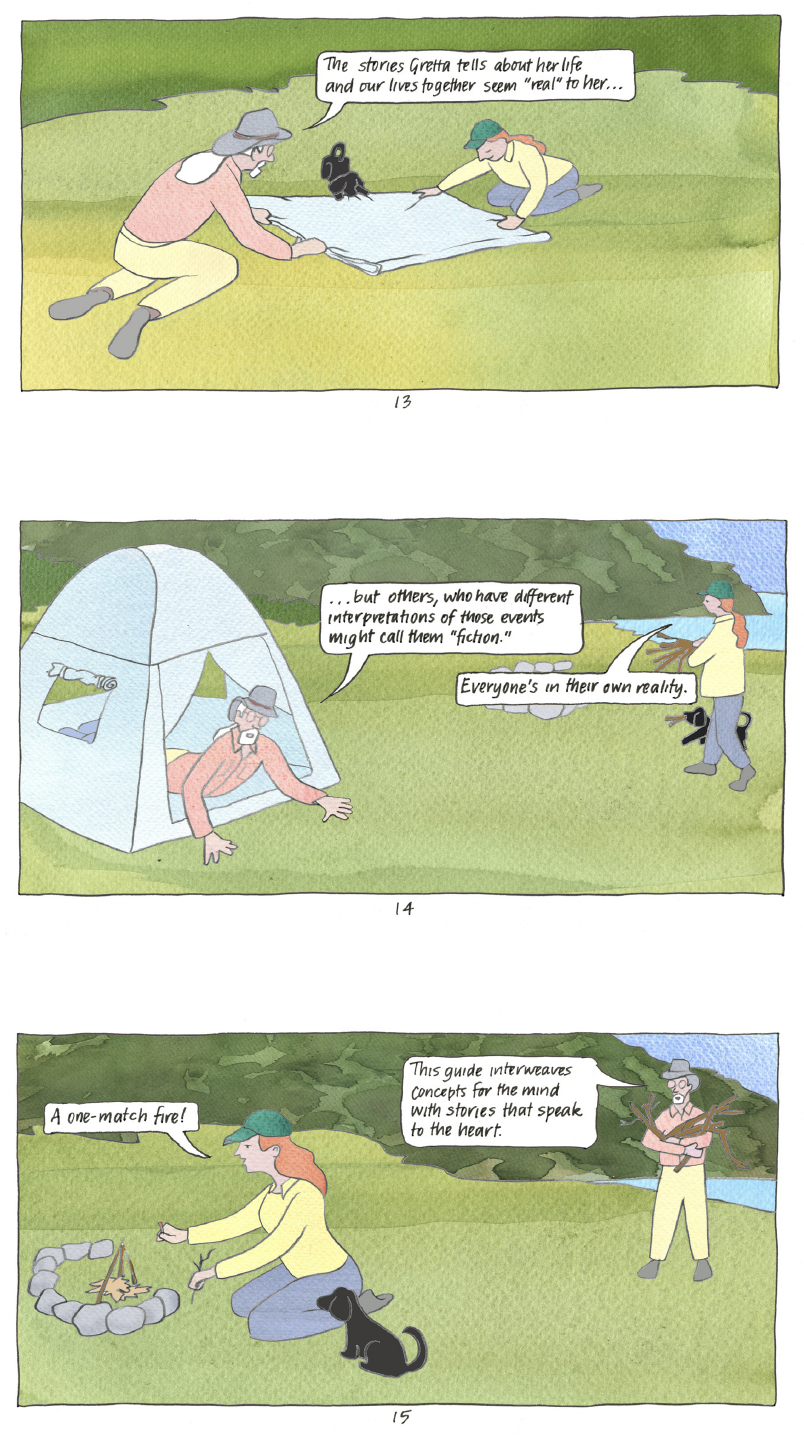Your Way There audiobook guide
Your Way There front cover
Chapter 1 — A Double Rainbow
We had spent the night camping on an island accessible only by boat.
The Big Four deeply embedded defenses: Fight, Flee, Freeze, and Fawn.
The caption would read: “Grandma Capsizes in Kayak and Drowns!”
Chapter 2 — A Full Spectrum Perspective
I opened to a blank page of my sketchbook and drew a circle and divided it into different size pie pieces.
We all want that super pill, secret tool, magic wand, or time machine that will transport us instantly to who and where we want to be.
The Four Stages of Change
Sitting quietly, I join my wise, watchful Whole Self and survey all my coexisting and contrasting realities.
Chapter 3 — Nurturing Parent or Judging Parent?
The bait that lured you was the praise given when you were judged as wonderful, ‘perfect.’
I drew a large circle on my pad. “This time it is the Full Spectrum of you as that little girl. Describe the pie slices.”
On my pad, I drew three circles, one on top of the other.
I nodded and added a J on the left and an N on the right side of the circle labeled P.
The Judgmental Parent doles out both praise and blame, creating and then reinforcing their child’s Pride and Shame identities.
The child or adult who declares, ‘You’re not the boss of me! I’m doing the opposite of what you want!’ is still guided by the expected judgment of someone else, rather than an inner assessment.”
The Nurturing Parent is helping the child to focus on his or her own experience rather than look to the judgment of others.
Or, our central control can be ruled by a rigid, narrow-sighted version of a Judgmental Parent, acknowledging only good or bad, right or wrong, success or failure, and other black or white, either/or interpretations, issuing defining verdicts about our identity and experience.
Chapter 4 — How Interpretation Directs Our Path
How we interpret the action, what meaning we give to the action and objects involved, is key to what happens next.
Moments after the vacuum was revealed, Charlie’s mom was by Sandra’s side explaining why this was best and how much cleaner Sandra’s house would be now that she had a suitable machine.
She focused on the interpretation, “I know how to get where I want to go.”
“Oh look!” she exclaimed. “Someone left a potato!”
Chapter 5 — Inner Camera or Outer Camera
I often use the metaphor of viewing our life through an Outer Camera, as if we are seeing ourselves through the eyes of a Judgmental Parent who is intent on declaring a verdict of good or bad, right or wrong.
An Outer Camera emphasizes a quick and easy, superficial judgment on how we imagine our appearance and actions would be rated by others.
Our Inner Camera, on the other hand, is focused on our Full Spectrum, inner experience.
Are we satisfied, disappointed, challenged, frustrated? How are we energetically connecting with others? When we rely on our Inner Camera, we take into consideration other people’s perceptions and interpretations but are not governed by their judgment.
We can abdicate our self-determination to codes created by ancestral figures, outmoded rules of behavior that were necessary for survival in the past but are no longer relevant.
With our Nurturing Parent as watcher and guide, we can give ourselves comfort and compassion while having the courage to be curious, contemplating our interpretations and reactions.
Chapter 6 — Activation! Do We Fight, Flee, Freeze, or Fawn?
Since the beginning of life on Earth, the impulse to stay alive has produced an elaborate array of survival mechanisms.
In that moment, I perceived myself as rational and assertive—the Suffragette, oppressed by male authority and standing up for her reasonable rights.
When we avoid our own awareness of contradictory and uncomfortable thoughts and feelings, though, the banished ideas and emotions resort to oozing out as nagging sensations of unease through the crack beneath the door or bursting through the locks and shouting, “Surprise!” when we least expect or want a reunion.
We can choose to be bravely vulnerable and open ourselves to our own Full Spectrum of thoughts, feelings, and associated experiences and be curious about the other person’s equally complex Full Spectrum.
Chapter 7 — Bodyguards to the Rescue!
Sarah might imagine a stern traffic cop, standing in front of a refrigerator and holding a stop sign.
A hypochondriac might imagine his or her Bodyguard as a serious-minded doctor, the Doc, with light and stethoscope, always ready to examine.
A client recognized how her husband kept his anxiety at bay and avoided uncomfortable emotions by being constantly active—Doing! Doing! Doing! . . . She named his Bodyguard Dan the Doer, picturing him with his headset on, phone in one hand, and coffee in the other.
So, she’d call in her Bodyguard Fantasy Fran, the romance novelist, and, focusing elsewhere, feel soothed and comforted.
Patrick pictured his anxious Bodyguard as Jumpy Jack, a basketball player in a perpetually tied game, grabbing the ball, desperate to score the winning point, and terrified he will fail.
In one tearful session, Julie identified her mean-girl, quick-to-judge Bodyguard, who always wore the coolest outfits and was up on all the hottest restaurants, books, and topics, as Peggy Perfect.
Poor Pitiful Pearl was birthed as a protector, a first responder helping me to steer through the judgments that came from every direction.




























































